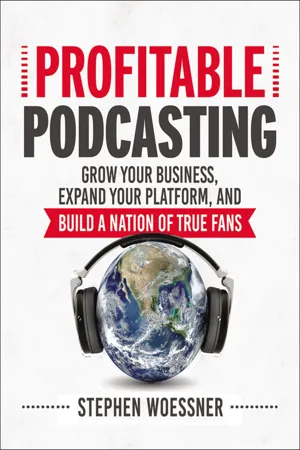![]()
CHAPTER 1
OVERCOME YOUR BIGGEST OBSTACLES TO SUCCESS
On the surface, this book looks a lot like a book about podcasting—which it is. But it’s more than that. My team and I worked tirelessly to make this the deepest, most comprehensive resource we could assemble on the topic of podcasting for small-business owners trying to grow their businesses. I promise you will find that every aspect of creating, producing, launching, and promoting your podcast to grow your business is covered in precise detail within these pages.
Each of the technical systems are dissected, including every piece of software, the specific content in template form you will need for the systems, the guest advocacy process, how to set up distribution channels, site traffic, and analytics and why they matter, along with what it all means. We’ve even included success stories from a number of small-business owners who are using podcasting as a strategy to grow revenue and build true fans. Each story examines the business model and specifically how podcasting is adding value so you can apply the same principles to your business.
Nothing has been left out. It’s all here.
But there is more—much more—that a small-business owner needs to know about podcasting before jumping into the deep end of the pool.
A podcast is just a tool. It’s just a platform. A platform is simply a conduit for distributing or sharing content. No platform in and of itself will help your business grow revenue.
Therefore, in order for your podcast to be of value to your business, there needs to be purpose behind the guests you invite to be on your show. There needs to be purpose behind the questions you ask your guests. There needs to be purpose behind how you nurture and take care of your guests before their interviews and after their episodes have aired. Ultimately, you need a strategy for how your podcast will grow your business, expand your platform, and build your nation of true fans.
Having interviewed nearly 600 of today’s top business owners—and having talked with, consulted with, or worked with many of them in producing and launching their own podcasts—I can say with certainty that there are typically three primary challenges that arise in the mind of a business owner who is considering podcasting. Some business owners need to confront all three, others perhaps just two. But every business owner will need to confront at least one.
1. How will my podcast make money and help grow my business?
2. How much time will this take me?
3. How will I get guests? (Or, the variation: What if no one accepts my invitation to be a guest on the show?)
We will address the revenue question throughout the book. But, we will dive deep into questions 2 and 3 right now because they are critically important to getting your mindset right before heading down the podcasting path. If you don’t get your mindset right, I assure you, there will be setbacks and challenges along the way. Without the correct preparation you will be tempted to quit—and you likely will. However, if I help you properly set expectations, when the challenges come your way, instead of being tempted to quit, you can confidently say to yourself, “Ah, Stephen said this would happen and that I’d feel this way,” and you will push forward.
Don’t ever quit.
Avoid the Time Trap
One of the questions I am asked most often by business owners who have considered a podcast for their business is, “How much time will having a podcast take out of my schedule?” It’s a great question because we should all protect our schedules.
Most business owners assume the answer is ten hours a week—and that the solution will require them to add staff and make other investments. But here’s the reality: You can have an awesome, top-rated podcast in iTunes by investing less than four hours per month. Yes. Four hours. The system described in this book illustrates our entire process and shows how to duplicate the strategy and the results in as little as four hours per month.
Would you grow revenues faster if you invested more time? Likely yes, but four hours a month is an excellent place to start.
So why would business owners assume that my answer would be ten hours a week? Because then it would be easy for them to justify why they hadn’t pursued it more seriously. But in fact, it isn’t the perceived time commitment that stops a small-business owner from having a podcast.
It is fear.
Fear often rears its ugly head in an attempt to derail the entrepreneurial journey you’re on. Fear will beat you to your knees if you let it. Fear will cheat you out of success in all aspects of your business, including developing a great platform like a podcast so you can grow revenue and build a nation of true fans.
Once business owners are assured that their time investment will be only about four hours per month, a second challenge typically comes to mind—one with the subconscious goal of thwarting the podcast from gaining any additional momentum, to snuff out the fire that was building.
Your Biggest, Most Painful Challenge
“Stephen, how will I get guests?” Or the variation: “What if no one accepts the invitation to be on my show?” These two fear-laden questions should serve as warning signs that something sinister is lurking. If you let them, they will keep you in check and prevent you from moving forward. The truth is, we all face such challenges. It’s just that some people are better than others at pushing themselves past them.
In my opinion, this challenge may be blocking your success not just with podcasting, but in other areas of your business as well.
The challenge is known as the “impostor syndrome.”
Clinical psychologists Pauline R. Clance and Suzanne Imes coined the term in 1978 to describe high-achieving individuals who are unable to internalize their accomplishments and who consequently fear being exposed as a “fraud.” Actual, objective evidence of their competence doesn’t matter to those who exhibit the syndrome. They remain convinced that they’re frauds. They feel that they don’t deserve the success they have achieved. Calling it “luck” or “good timing,” they never take credit for their accomplishments. Perhaps they believe that they’ve tricked others into thinking they are more intelligent and competent than they actually are.
Now let’s take that definition and break it down into its two core ingredients.
Ingredient #1: the inability to internalize accomplishments and a persistent fear of being exposed as a “fraud.”
Have you ever walked into a meeting and felt that you weren’t worthy—or that you didn’t belong there? Perhaps someone on the selection committee, award committee, or board of directors had made a mistake in selecting you. Heck, maybe even some of your colleagues, family members, or friends validated your own suspicions and asked you the seemingly innocent question, “So why did they pick you?”
I began to learn about the impostor syndrome back in 2009, around the time my first book was published. I was an academic staff member at the University of Wisconsin–La Crosse. After my book became popular with small-business owners, several of the UW campuses around the state asked me to teach a class at their respective campuses. Awesome. One day I mentioned this opportunity to a family friend: I told him I was headed to the University of Wisconsin–Green Bay the next day to teach a class based on my search engine optimization (SEO) book.
My friend looked at me and said, “Well, why are they having you teach the class? Couldn’t they find someone in Green Bay to teach it?”
My friend was not trying to be hurtful—not in the least. But those comments hit me hard. Never mind that my SEO book was number 3 in the United States, or that I had just been interviewed for Inc. Magazine, or any of the other credibility indicators. When he asked me that question, I actually paused and thought about it. “Yeah, why are they hiring me to teach? Am I good enough? Do I have what it takes? Am I the best they could bring in? Do I deserve to be there? Am I a fraud? Do I even know what I’m talking about?”
There is nothing unique about my story. We have all had experiences where we begin to hear the voice in our heads whispering—or in some cases shout-ing—“Who do you think you are?”
The impostor syndrome will work hard to hold you back.
High performers with impostor syndrome may work obsessively to prevent people from discovering that they’re “impostors.” And talk about a vicious cycle: The hard work leads to more praise and success, which only perpetuates the impostor feelings, leading the “impostor” to work even harder, which can lead to sleep deprivation, burnout, and worse.
Ingredient #2: The “impostor” takes the proof of success and passes it off as luck, timing, or the result of deceiving others into thinking he or she is more intelligent and competent than the person believes.
Has your business ever gone through a growth spurt that you couldn’t explain? Have you ever looked around your office and suddenly realized you have some amazing people working for you and looking to you for leadership—and, yet, you cannot figure out what they see in you? Have you ever felt uncomfortable before a presentation with a new client? Did you wonder why the client invited you to the table?
Why do we ask ourselves such lousy and unfair questions?
Here’s the important point that I really want you to get. When you ask yourself, “How on earth were we able to hire such amazing employees? Don’t they know that we don’t know what in the world we’re doing?” your brain does a funny thing . . . it gives you an answer.
It’s a crummy answer but it’s an answer. Your brain doesn’t want to make you out to be a liar—so it gives yo...






